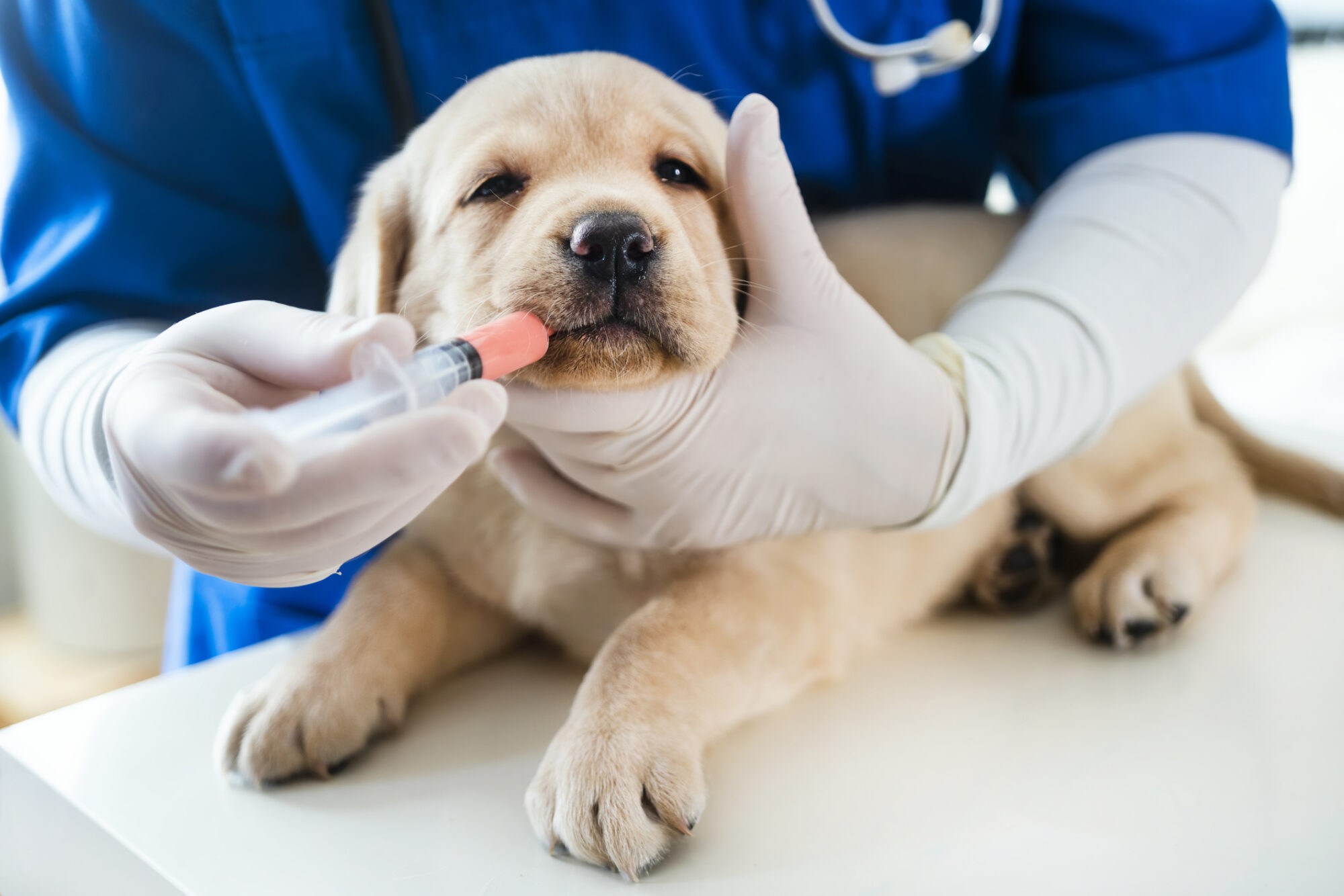Our Blog
The Importance of Pet Dental Health

At Bayside Animal Hospital, we understand that your pet’s oral health is critical to their overall well-being. And just like humans, pets require regular dental care to maintain their healthiest and happiest lives.
Continue…Fibrocartilaginous Embolism (FCE) in Dogs

If your dog suddenly starts limping, dragging a leg, or showing weakness in the back end, it can be quite alarming. One possible cause is fibrocartilaginous embolism (FCE), a spinal cord condition that affects blood flow and can lead to sudden lameness, knuckling paws, or even leg paralysis.
At Bayside Animal Hospital, we know how frightening it is to see your pet struggle to stand or walk. Understanding this condition and how it’s treated can help you respond quickly and support your dog’s recovery with confidence and compassion.
Continue…Holiday Foods You Shouldn’t Feed Pets

The holiday season is all about giving, and while it’s tempting to give your furry family member some tasty samples from the holiday spread, it’s important to know that some of our festive favorites are toxic foods for pets.
To keep your cat holidays and dog holidays merry and bright, our team at Bayside Animal Hospital has put together some holiday pet safety tips to help protect your pets from dangers on the dinner table.
Continue…Thanksgiving Safety Tips for Pets

Thanksgiving is a time for family, friends, and a table filled with turkey and all the trimmings. And while it may be tempting to share a scrap or two with your furry family members, it’s important to know that pets and people foods can sometimes be a recipe for disaster.
In this guide to a pet Thanksgiving safety, our team at Bayside Animal Hospital offers helpful dos and don’ts for sharing food plus other important holiday safety tips for pets.
Continue…November is National Pet Diabetes Month

November is National Pet Diabetes Month, a time dedicated to raising awareness about this common yet manageable condition. At Bayside Animal Hospital in Granite Bay, we want to help you recognize the signs of diabetes in pets so you can act quickly, and keep your furry friend healthy and comfortable.
Diabetes occurs when your pet’s body either doesn’t produce enough insulin or can’t use it properly. Left unchecked, it can affect every system in the body. The good news is that, with early detection and proper care, most pets can live long, happy lives.
Continue…Halloween Pet Safety Tips

Halloween is many people’s favorite holiday, but all the frights are more than make-believe for your pet—they can be hazardous. Our team at Bayside Animal Hospital wants to help you keep your pet safe when the ghosts and ghouls come out to play. We’ve enlisted some experts to offer Halloween safety advice.
Barb the black cat says, “Keep your pet inside on Halloween night. The neighborhood is full of scary creatures and mischievous rascals.”
Continue…Why Is My Dog Throwing Up Worms?

There’s nothing like waking up to a happy pup—unless they’ve had a rough night and left you a surprise. If your dog is vomiting worms, it’s alarming and, yes, a bit gross. But don’t panic—Bayside Animal Hospital is here to help you understand what’s going on and how to take action to protect your pet’s health.
Let’s explore what might be causing this unsettling symptom, how serious it is, and what you should do next.
What It Means When a Dog Throws Up Worms
Worms in vomit almost always indicate a parasitic infection, and while it’s not super common to see them this way, it does happen, especially with roundworms.
Roundworms are one of the most common intestinal parasites in dogs. In heavy infestations, they may migrate into the stomach and get expelled during vomiting. The worms themselves are often white or light tan, several inches long, and resemble spaghetti. If this sounds like what you’re seeing, roundworms are the likely culprit.
Other worms, like tapeworms and hookworms, don’t usually show up in vomit, but they can still cause digestive symptoms and serious health issues if left untreated.
Common Signs of a Worm Infestation
Seeing worms in vomit is a pretty dramatic sign, but often, other symptoms show up first. Keep an eye out for these red flags:
- Vomiting or diarrhea (sometimes with blood)
- Potbellied appearance, especially in puppies
- Weight loss despite a healthy appetite
- Scooting or excessive licking of the rear
- Worm segments in feces or around the anus (tapeworms often look like small rice grains)
If you’re noticing any combination of these symptoms—especially vomiting—you should contact your vet immediately. Early diagnosis makes treatment easier and more effective.
How Did My Dog Get Worms?
Even the cleanest, best-cared-for dogs can get worms. Parasites are sneaky and extremely common. Your dog may have been exposed through:
- Ingesting infected feces or contaminated soil at the park
- Fleas, which can carry tapeworm larvae
- Eating prey animals like rodents
- Transmission from mother to puppy, especially with roundworms and hookworms
Because the life cycle of parasites can vary, and some can even infect humans, prevention is key.
Treatment Options for Worms in Dogs
The good news? Most worm infestations are treatable, especially when caught early. Your veterinarian will likely recommend:
- Fecal testing to determine the type of worm
- Prescription deworming medications, which may need to be repeated
- Follow-up care to ensure all worms and eggs are eliminated
In some cases—especially if your dog has lost weight or is experiencing severe vomiting—supportive care like fluids and anti-nausea medication may be necessary.
And don’t forget about environmental cleanup. Picking up feces promptly, cleaning your pet’s bedding, and using flea prevention are all essential steps in stopping the worm life cycle.
Prevention Is the Best Medicine
To reduce the risk of future infestations, talk to your vet about a routine parasite prevention plan. Bayside Animal Hospital offers wellness exams where we can:
- Check for signs of worms and other issues
- Recommend the right parasite prevention products for your dog
- Discuss any changes in behavior, appetite, or energy that may signal a health concern
Monthly parasite prevention is a simple, effective way to protect your pup from worms and other parasites before symptoms ever appear.
Your Dog Deserves Relief—We’re Here To Help
Vomiting worms is never something to ignore. The veterinarians and staff at Bayside Animal Hospital are experienced in diagnosing and treating all types of parasite infections, including roundworms, tapeworms, and hookworms. If you’ve noticed vomiting or other signs of worms in your dog, call (916) 791‑8387 to schedule an exam. We’re here to help your pup feel better fast—and keep those pesky parasites at bay.
Why You Should Use Pet Sunscreen and Bug Spray

Here in Granite Bay, California, we’re fortunate to enjoy plenty of sunshine and outdoor beauty—but with that comes two common challenges: intense UV rays and a surge in biting insects. At Bayside Animal Hospital, we often see pets dealing with sunburn, bug bites, and even more serious issues like tick-borne illnesses. The good news? With the right sunscreen and bug spray, you can protect your furry companions and make outdoor time safer and more enjoyable.
Continue…4th of July Pet Safety Tips

Fireworks, barbecues, and festive gatherings—what’s not to love about the Fourth of July? While the holiday brings fun and excitement for people, it can be overwhelming or even dangerous for our furry family members. At Bayside Animal Hospital, we want to make sure your pets stay calm, safe, and healthy while you celebrate Independence Day. With just a few proactive steps, you can keep tails wagging and whiskers unruffled all weekend long.
Continue…What is Canine Seborrhea?

Canine skin disorders such as canine seborrhea can significantly impact a dog’s health and well-being, so it’s important to know the signs so you can seek relief fast for your precious pooch. In this blog, our team at Bayside Animal Hospital explores the causes, symptoms, and treatments for canine seborrhea.
Continue…

